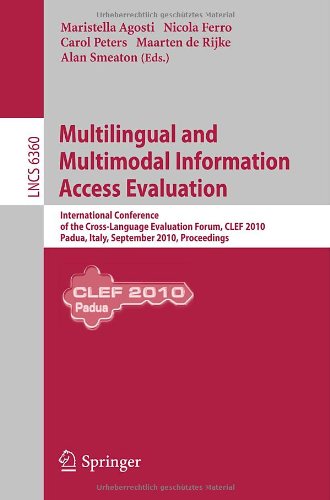

Most ebook files are in PDF format, so you can easily read them using various software such as Foxit Reader or directly on the Google Chrome browser.
Some ebook files are released by publishers in other formats such as .awz, .mobi, .epub, .fb2, etc. You may need to install specific software to read these formats on mobile/PC, such as Calibre.
Please read the tutorial at this link: https://ebookbell.com/faq
We offer FREE conversion to the popular formats you request; however, this may take some time. Therefore, right after payment, please email us, and we will try to provide the service as quickly as possible.
For some exceptional file formats or broken links (if any), please refrain from opening any disputes. Instead, email us first, and we will try to assist within a maximum of 6 hours.
EbookBell Team

4.4
62 reviewsIn its ?rst ten years of activities (2000-2009), the Cross-Language Evaluation Forum (CLEF) played a leading role in stimulating investigation and research in a wide range of key areas in the information retrieval domain, such as cro- language question answering, image and geographic information retrieval, int- activeretrieval,and many more.It also promotedthe study andimplementation of appropriateevaluation methodologies for these diverse types of tasks and - dia. As a result, CLEF has been extremely successful in building a wide, strong, and multidisciplinary research community, which covers and spans the di?erent areasofexpertiseneededto dealwith thespreadofCLEFtracksandtasks.This constantly growing and almost completely voluntary community has dedicated an incredible amount of e?ort to making CLEF happen and is at the core of the CLEF achievements. CLEF 2010 represented a radical innovation of the “classic CLEF” format and an experiment aimed at understanding how “next generation” evaluation campaigns might be structured. We had to face the problem of how to innovate CLEFwhile still preservingits traditionalcorebusiness,namely the benchma- ing activities carried out in the various tracks and tasks. The consensus, after lively and community-wide discussions, was to make CLEF an independent four-day event, no longer organized in conjunction with the European Conference on Research and Advanced Technology for Digital Libraries (ECDL) where CLEF has been running as a two-and-a-half-day wo- shop. CLEF 2010 thus consisted of two main parts: a peer-reviewed conference – the ?rst two days – and a series of laboratories and workshops – the second two days.